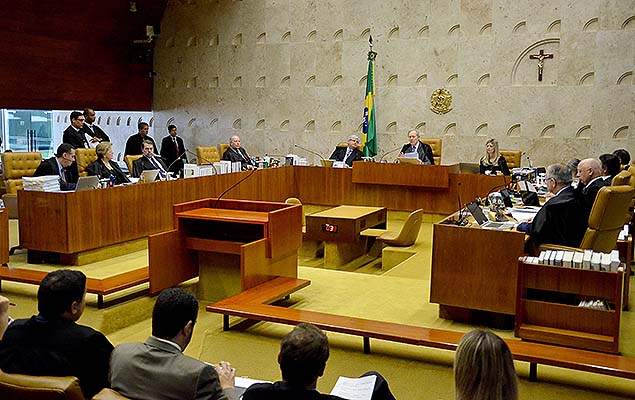Latest Photo Galleries
Brazilian Markets
12h03 Bovespa |
-0,14% | 129.028 |
16h43 Gold |
0,00% | 117 |
12h17 Dollar |
+0,39% | 5,0873 |
16h30 Euro |
+0,49% | 2,65250 |
ADVERTISING
Arrest after Second-Instance Conviction Is Likely to Encourage Plea Bargains
02/22/2016 - 08h42
Advertising
GRACILIANO ROCHA
SPECIAL ENVOY TO CURITIBA
MARIO CESAR CARVALHO
FROM SÃO PAULO
The Brazilian Federal Supreme Court's decision to authorize arrests after second-instance convictions last week is likely to encourage new informers in the Federal Police's Lava Jato operation, which is investigating embezzlement at Petrobras.
That is the opinion of public and defense attorneys, a rare case in which antagonist sides agree on a subject.
| Renato Costa/Folhapress | ||
 |
||
| The Brazilian Federal Supreme Court authorized arrests after second-instance convictions. |
Representatives of the Department of Public Prosecution interviewed by Folha say that the end of the era of very extensive appeals could lead the Lava Jato operation to a closing different from that of cases such as the Banestado scandal, which led to the conviction of nearly a hundred people by the courts of the state of Paraná, but whose sentences were carried out in only three cases. Most of them expired while appeals were being debated at the Supreme Court of Justice.
Vladimir Aras, the member of the group of the Attorney General's Office which is investigating the involvement of politicians who have liberty to hold plea in the petrolão scheme, says that the defendants who have been convicted in two instances now have three ways to avoid serving time for their crimes: expiration, escape and plea bargains. "The door of expiration is closed now," says Aras.
AFFECTED POTENTIAL
Lawyers working on the cases believe that the Supreme Court's decision is against the constitution. Edward Carvalho, who represents the former president of contractor OAS, Léo Pinheiro, sentenced to 16 years in prison, believes that the appeal is likely to be judged within six months by the Federal Regional Court of Porto Alegre. If it the appeal is denied, Pinheiro will go to prison.
The constitution and the code of criminal procedure establish that defendants can only be arrested after the sentence has received a final verdict by the court of last resort, that is, when there are no more possible appeals.
Lawyer Alberto Toron, who is representing Fernando Bittar, a partner in the country house visited by former president Lula in Atibaia (SP), says that plea bargains are likely to increase in number because when the penal code "appears threatening" the possibility of plea bargains and confessions grow.
Toron says that the Supreme Court's decision is equivalent to a strategy used by the Inquisition during the 16th and 17th centuries. "As soon as the inquisitors showed their torture instruments, those being investigated would start confessing," he says.
The decision is also likely to impact the recovery of assets abroad. Aras believes that Brazil has US$ 230 million blocked in other countries.
Translated by THOMAS MUELLO
Read the article in the original language



